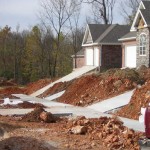guest blog by Deborah Goonan
When I read the article about zombie California suburbs in the Atlantic last week (link below), I realized that Florida is not the only zombie state. Check out the article and the photographs. Haven’t we been told that HOAs are “sustainable” land planning – an efficient use of scarce, but valuable resources? I’d say we’ve been hoodwinked.
Driving around several nearby Central Florida HOA subdivisions in the past several months, I have observed more empty streets and overgrown fields than houses under construction. In one subdivision, 9 holes of a golf course and a new clubhouse promised to the residents several years ago has never been completed. In another, zombie foreclosures and unsold spec homes are surrounded by finished roads and cleared lots waiting for buyers. A small section of that subdivision was completed prior to 2006. In yet another, the county recently took over the private water and sewer system, because only a few houses were built before the developer disappeared.
Like California, Florida experienced a frenzy of new construction in the early part of the century, nearly all of them HOAs, and that came crashing down when the recession hit. By 2008, many developers had abandoned construction, often filing for bankruptcy. New developers have purchased some of these unfinished subdivisions, but others remain stalled. In the past year or so, new construction has picked up here in Florida, but certainly not at a brisk pace. It will take years to build on all of those lots, and I suspect many areas will be rezoned for other uses.
In the meantime, all those nearly abandoned open fields are favorite spots for four-wheel recreation vehicles, dirt bikes, and garbage dumping.
What about existing construction?
I previously blogged about Florida making the national news because of its many failed condo conversions, now reverting back to apartment buildings. Due to loopholes in Florida statutes, investors are forcing owners to sell at a loss, basically kicking condo owners to the curb with their outstanding mortgage balances.
A recent Realty Trac report ranks the top four cities with the highest number of foreclosures in the nation: Miami, Orlando, Tampa, and Jacksonville.1 Sadly, Florida’s latest claim to fame.
Yet, ironically, thousands of new luxury condo tower units are underway, especially in South Florida, where prices are increasing with an influx of foreign investment, making it difficult to sell existing condos.2 And several new subdivisions have been approved in the Orlando metro area, to include thousands of homes as far east as Daytona.3 Even the Catholic Diocese of Orlando is planning urban infill with a 900 home subdivision adjacent to their retreat center. 4
Why not simply finish up the existing Zombie subdivisions first?
Apparently, according to the Urban Land Institute, the next generation of buyers does not want to live in those suburban locations. Now, all of a sudden, the market has shifted to more urban locations, or denser suburbs with urban amenities.5
But who will buy all these brand new, densely packed homes, let alone all the existing zombies? First-time buyers don’t have the money or access to mortgage loans.6 Orlando has lost 80,000 households to “doubling-up,” a nationwide trend of folks moving in with family and friends in order to save money and share rent or living expenses, because housing is becoming less affordable.7 Looking at year-to-year market trends reported by Orlando Regional Realtor Association, completed sales are up by 18%, prices and housing inventory are up by 3.9% and 4.64% respectively. But new contracts are down 15% from a year ago.8 Taken together; these reported trends seem to indicate a slow-down in buying activity.
I know Zombies are in vogue these days, but haven’t we had enough?
(link to Atlantic article, The Unfinished Suburbs of America)
Blog References:
1. Orlando remains among top cities for foreclosures
http://www.bizjournals.com/orlando/news/2014/11/13/orlando-remains-among-top-cities-for-foreclosures.html?iana=ind_rre
2. South Florida condo market faces headwinds amid new construction boom
http://www.miamiherald.com/news/business/article1980992.html
3. Minto to Start Building 3,000 home community near Daytona
http://www.bizjournals.com/orlando/blog/2014/11/minto-to-start-building-3-000-home-community-near.html?iana=ind_rre
4. Catholic Diocese pitches 900-home community…
http://www.orlandosentinel.com/news/seminole/os-san-pedro-center-catholic-diocese-20140809-story.html
5. The Changing Face of Residential: Denser and More Urban than Ever
http://urbanland.uli.org/economy-markets-trends/changing-face-residential/?utm_source=twitter&utm_medium=social&utm_campaign=magazine
6. Where have all the first-time buyers gone?
http://www.bizjournals.com/orlando/news/news-wire/2014/11/03/where-have-all-the-first-time-buyers-gone.html?iana=ind_rre
7. Orlando Metro area loses nearly 80,000 households
http://www.bizjournals.com/orlando/morning_call/2014/11/orlando-metro-area-loses-nearly-80-000-households.html?iana=ind_rre
8. Metro Orlando Housing Trends Summary 2014 (ORRA)
http://c.ymcdn.com/sites/www.orlandorealtors.org/resource/resmgr/Statistics_Reports/housingtrendssummary.pdf

